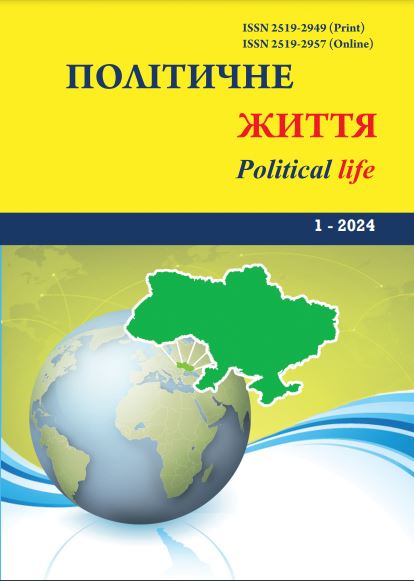Collective memory as a factor of civil society activation
DOI:
https://doi.org/10.31558/2519-2949.2024.1.2Ключевые слова:
collective memory; civil society; national identity; public organizations; social groups; public; charitable organizations; social normsАннотация
The article examines collective memory as a factor in the activation of civil society. Theoretical and methodological approaches to the interpretation of collective memory and to the interpretation of civil society are considered. Correlation analysis between the two categories at the theoretical and applied levels was carried out.
Civil society is a comprehensive phenomenon that reflects the social state of development in the broadest sense, but can be defined through the prism of sociological (as a social structure), regulatory and political science (as non-governmental organizations), legal and legal approaches (as the realization of civil rights), and as well as the methodology of social constructivism (civil society exists in context and through communication).
As a result of the absolutization of the role of public organizations and rational theories, scientists focus less attention on the study of irrational factors, however, the latter are able to influence social activity on a larger scale. In particular, it has been proven that collective memory activates civil society as a result of constructing national identity, contributing to the formation and preservation of legitimate social norms. Through collective memory, the level of national consciousness and civic responsibility increases, and therefore conditions are created for civic activity, which ultimately leads to the institutionalization and progress of civil society.
Collective memory, unlike historical memory, does not falsify the past, therefore the demands articulated by civil society through the memory of the consequences of certain events are the needs of the public, which forces this public to implement its activities expediently, effectively, institutionalized and for the public good.
It is substantiated that the relevance of the study of collective memory is extremely important for Ukraine in the conditions of martial law, because the modern social state is characterized by significant irrational factors.
Библиографические ссылки
Nagorna, L. (2012). History and collective memory. Scientific notes of the Institute of Political and Ethnonational Studies named after I. F. Kuras NAS of Ukraine. Issue 2. P. 6-27.
Karas, A. (2003). Philosophy of civil society in classical theories and non-classical interpretations: [monograph] . Ministry of Education and Science of Ukraine, Lviv. national University named after Ivan Franko. – Kyiv; Lviv: Ed. center of LNU named after Ivan Franko. 519 p.
Kyridon, A.M. (2010). The construct "collective memory" in the focus of time: theoretical discourse. Slavic discourse: Collection science. Rivne: RIS KSU. P. 65-71.
Political system of Ukraine: constitutional model and political practices (2023): monograph / col. author: G. I. Zelenko (director, scientific editor) and others. Kyiv: IPi&D named after I. F. Kuras NAS of Ukraine. 536 p.
Tkach, O. I. (2017). Formation and development of volunteering as an institution of civil society. Bulletin of Taras Shevchenko Kyiv National University. Politology. Issue 1. P. 34-38.
Halbwachs, M. (1925/1992). About collective memory. [L.A. Kozer, Ed. and trans.] Chicago: University of Chicago Press.
Halbwaks, M. (2007). Social frames of memory / Trans. with Fr. and introduction article by S.N. Zenkin M.: Novoe izdatelstvo. 348 p.
Halbwachs, M. (1950/1980). Collective memory. [M. Douglas, Ed.] New York: Harper & Row.
Jung, K.G. (2010). Psychology of the unconscious / Trans. with English – 2nd edition, Moscow: "Kogito-Center". 352 p.
Karl-Dieter, Opp. (2001). Collective Political Action. A Research Program and Some of Its Results. Analyze & Critique Volume 23 Issue 1. S. 1-20.
Mete Sefa Uysal, Yasemin Gülsüm Acar, Jose-Manuel Sabucedo, Huseyin Cakal (2022). ‘To Participate or Not to Participate, That’s the Question’: The Role of Moral Obligation and Different Risk Perceptions on Collective Action. Journal of Social and Political Psychology, Vol. 10(2), 445–459.
William, Hirst, Jeremy, K. Yamashiro, & Alin, Coman (2018). Collective Memory from a Psychological Perspective. Trends in Cognitive Sciences, Volume 22, Issue 5, 438-451.
Opalko, Yu.V. (2009). Interaction of public organizations with state authorities in the implementation of the state policy of memory / Yuriy Volodymyrovych Opalko // Strategic priorities. No. 3. P. 42–49.
Volyanyuk, O.Ya. (2013). Public memory and politics: The art of the possible. K.: SE "NVC "Prioritety". 172 p.
Volyanyuk O. Ya. (2009). Public formations in the field of politics of memory of modern Ukraine. Education of the region: political science, psychology, communications. No. 3. P.122 – 126.

